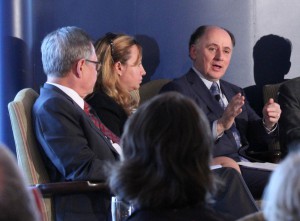Convening
An experienced moderator, facilitator and mentor, David believes that most organizations – large and small, public and private — have the potential to develop and enhance their convening abilities. Further, he believes that the skills associated with convening, which are often underestimated in their importance, are now becoming essential competencies for leaders.
When partnerships and collaboration are increasingly required in order to move initiatives forward, the ability to effectively bring together diverse stakeholders, with a purpose, can make a significant difference to a project’s success. This is especially true in an age that necessarily includes on-line convening, employing various technology platforms.
David has provided training in the form of workshops, seminars and lectures on the art and science of convening. His book on this subject serves as an indispensable guide for organizations aiming to develop their own convening capacities.
Strategy
Successful organizations are defined by well-articulated strategies. Whether it be an organization-wide strategic plan or a blueprint for a specific project or new initiative, strategies provide a framework to respond to dynamic circumstances.
David has developed a number of successful strategic plans through workshops, consultations and environmental scans. He believes that effective strategies are adaptive and most often the result of systems thinking and a clear evaluation of impact.
Building upon an organization’s vision and mission, David believes that the best strategies are concise, with a few well-defined priorities and specific, measurable objectives. At the same time, strategies should also be flexible, allowing an organization to be responsive to emerging opportunities.
Public Policy
It was once assumed that public policy was developed only within government; that’s not the case any longer. To be sure, we have many very smart and capable public servants who in the past were called upon more frequently to develop policy options for elected governments. Today, however, these internal sources are often under-utilized. Policy is now developed just as often elsewhere: by political staff, think tanks, universities, business associations, trade unions and other groups.
As a result, David believes that many organizations should consider further developing their own capacities to develop policy ideas and proposals. Where appropriate, this can be done on a collaborative basis, building partnerships with other stakeholders.
David has provided consultations and training on public policy and policy development with the objective of playing a helpful and constructive role with government leaders both at the elected level and within the public service.

